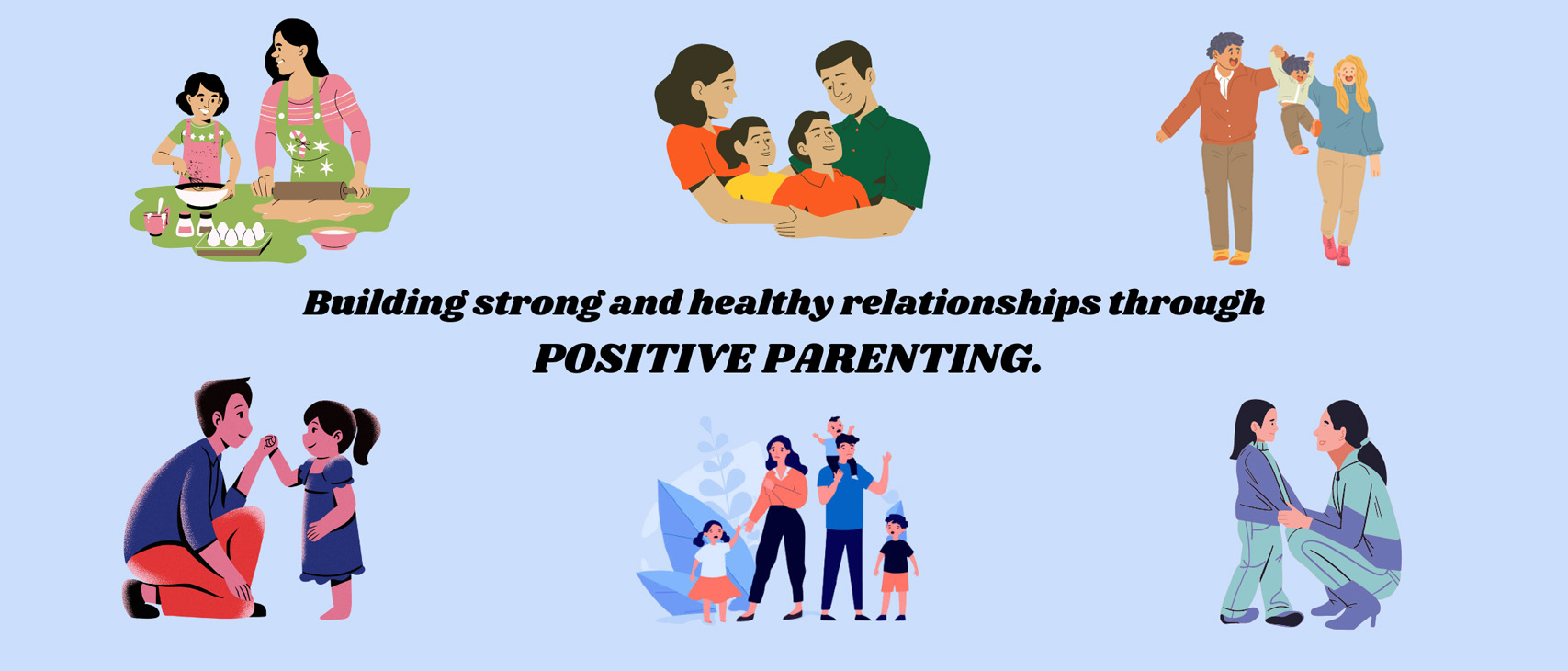Building strong and healthy relationship through Positive Parenting

Author: Karina Parikh
“To be in your children’s memories tomorrow, you have to be in their lives today.”- Barbara Johnson
| Benefits of positive parenting | What positive parents do | How it benefits both parent and child |
|---|---|---|
| Stronger bond with child | Show love, affection, and support | Improve child’s self-esteem and happiness |
| Improved behavior | Encourage positive behavior and use positive discipline techniques | Reduce behavioral problems and increase cooperation |
| Better communication | Listen actively, express empathy and validate feelings | Foster open and honest communication and trust |
| Increased autonomy | Encourage independence and provide choices | Promotes problem solving skills and self-confidence |
| Resilience | Teach coping skills and provide support in dealing with challenges | Help develop resilience and ability to handle stress |
| Emotional intelligence | Teach emotional regulation and empathy | Enhance emotional intelligence and social skills |
| Reduce conflict, stress, and parenting guilt | Focus on positive reinforcement rather than punishment or negative comments | Reduces conflict in the relationship and helps to prevent stress and parenting guilt |
| Benefits of positive parenting | What positive parents do | How it benefits both parent and child |
|---|---|---|
| Stronger bond with child | Show love, affection, and support | Improve child’s self-esteem and happiness |
| Improved behavior | Encourage positive behavior and use positive discipline techniques | Reduce behavioral problems and increase cooperation |
| Better communication | Listen actively, express empathy and validate feelings | Foster open and honest communication and trust |
| Increased autonomy | Encourage independence and provide choices | Promotes problem solving skills and self-confidence |
| Resilience | Teach coping skills and provide support in dealing with challenges | Help develop resilience and ability to handle stress |
| Emotional intelligence | Teach emotional regulation and empathy | Enhance emotional intelligence and social skills |
| Reduce conflict, stress, and parenting guilt | Focus on positive reinforcement rather than punishment or negative comments | Reduces conflict in the relationship and helps to prevent stress and parenting guilt |
Here are a few techniques of positive parenting that can help build a strong, healthy relationship with your child:
1. Active Listening: This technique involves truly listening to your child and trying to understand their perspective. For example, if your child is upset about something that happened at school, instead of dismissing their feelings, you can actively listen by saying something like “I can see that you’re really upset about what happened at school today. You can tell me I am listening.”
2. Positive Reinforcement: This strategy involves rewarding good behavior and positive actions. For example, if your child completes their homework on time, you can positively reinforce that behavior by saying something like “Great job on finishing your homework on time, I’m proud of you!”
3. Emotion Coaching: This method involves helping your child understand and express their emotions in a healthy way. For example, if your child is feeling angry about something, you can emotion coach by saying something like “I can see that you’re feeling really angry right now. It’s okay to feel angry, but it’s important to find healthy ways to express that anger.”
4. Consistent and Clear Limit Setting: This strategy involves setting clear and consistent limits and boundaries for your child, and enforcing them calmly and consistently. For example, if your child refuses to do their homework, you can set a clear limit by saying “I understand that you don’t want to do your homework, but you need to complete your homework so you can learn and do well in school. Let’s work together to get your homework done.”
5. Positive Problem-Solving: This method includes helping your child find creative solutions to problems and challenges. For example, if your child is having trouble making friends, you can help them find positive solutions by saying something like “I can see that you’re having trouble making friends. Let’s come up with a plan to help you make new friends.”
6. Showing Empathy: This technique involves putting yourself in your child’s shoes, understanding their feelings, and responding with compassion. For example, if your child is upset about something, you can show empathy by saying something like “I understand that you’re upset right now, that must be really hard for you. I’m here for you and I care about you.”
7. Give Choices: This strategy includes giving children some level of control over their lives, by giving them choices and options. For example, if your child is refusing to eat their vegetables, you can give them choices by saying “I understand that you don’t like vegetables, but it’s important for you to eat them for a healthy diet. Would you prefer to have broccoli or carrots with your dinner tonight?”
These are just a few examples of positive parenting techniques, and it is important to remember that every child and every situation is different. Positive parenting is an ongoing process that requires patience, understanding, and a willingness to adapt to the unique needs of your child.
| Techniques of Positive Parenting |
|---|
| Active listening |
| Positive reinforcement |
| Emotion coaching |
| Consistent and clear limit setting |
| Positive problem-solving |
| Showing empathy |
| Give choices |
In conclusion, positive parenting is a helpful parenting approach that supports children’s healthy growth. It is founded on respect for one another, free exchange of ideas, and encouragement. The promotion of healthy growth in children and the improvement of parent-child interactions have all been demonstrated benefits of positive parenting. It is a suggested parenting strategy for all parents, regardless of the age or temperament of their children.
REFERENCES:

